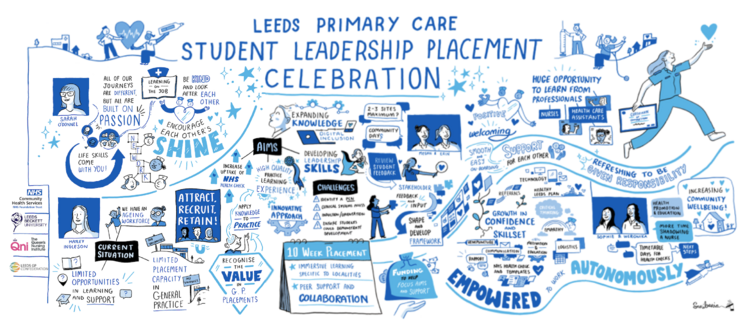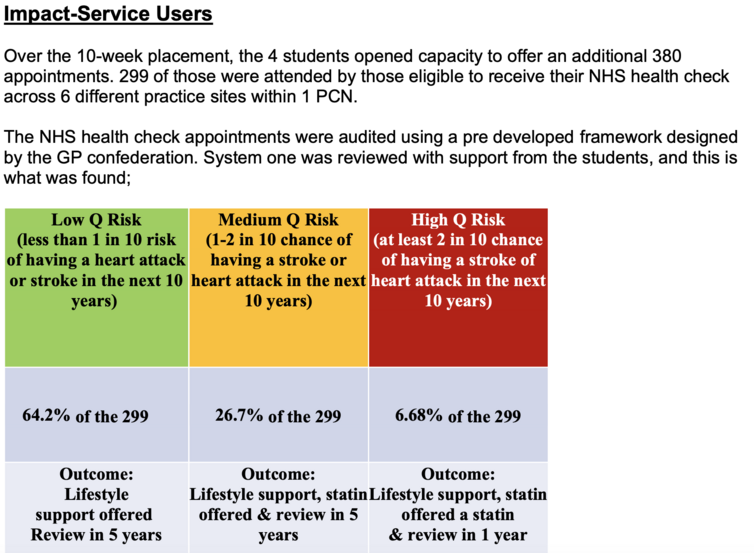The development of the ‘Leeds primary care student leadership placement’ was spearheaded by the practice learning facilitator (PLF) for Leeds Community Healthcare NHS Trust and Leeds General Practice in conjunction with the Queen’s Nursing Institute (QNI) Community Nursing Innovation Programme 2022–2023, in collaboration with various local partners, including higher education institutions (HEIs), NHS practice partners, local council organisations, integrated care board (ICB) and private, independent, and voluntary organisations. Over a 10-week period, the pilot programme involved four adult nursing students who assumed leadership roles in conducting NHS health check clinics across a primary care network (PCN) in Leeds.
The NHS ‘Five Year Forward View’ (2014) and NHS ‘Long Term Plan’ (date) set out ambitious plans to transform healthcare service delivery, managing increasing complexity at the heart of communities. Whilst general practice nurses are considered integral to the delivery of the preventative healthcare agenda (HEE, 2017, QNI, 2015), concerning workforce projections (NHS Digital, 2023, The Health Foundation, 2022) highlight a substantial shortfall in the number of general practice nurses available to meet the intentions of the NHS ‘Five year forward view’ and NHS ‘Long Term Plan’. The disparity between the current GPN workforce and what is needed to deliver healthcare of the future is compounded by a number of factors; An ageing general practice nursing population (QNI, 2015, HEE, 2017), and a lack of newly registered nurses opting for general practice as their first career destination (Butler, 2022).
Due to pandemic induced service changes, general practice placement opportunities were reduced by 91.6% across the Leeds region.
Consequently, the Practice Learning Facilitator went onto develop the Leeds Primary Care Student Leadership Placement which aimed to;
1. Expand high quality placement provision for pre-registration nursing students in general practice, working across PCN footprint.
2. Raise the profile of general practice nursing and provide fundamental exposure to career pathways available upon registration.
3. Enable pre-registration nursing students with the opportunity to develop leadership skills through delivery of NHS health check clinics.
4. Enable pre-registration nursing students with the opportunity to increase knowledge and understanding of primary prevention, health needs, health inequalities and digital health and inclusion.
5. Enable pre-registration nursing students to be supervised and assessed across a PCN.

How did we do this?
Step 1: The PLF scoped placement availability within general practice to understand the shortfall of placement opportunities within that environment
Step 2: Engagement with students and general practices to understand the demand for general practice placements and to understand the barriers and challenges to providing student placements from the general practice nurse perspective.
Step 3: To consider how placements could be offered in an innovative way to reduce pressure associated with historic placements that followed a 1:1 model of student supervision and assessment
Step 4: Scoping what other regions were doing to combat the placement capacity issues, learnt more about student led clinics and student lead healthcare from the wealth of literature available and attended conferences.
Step 5: Creation of a placement mapped against NMC proficiencies and skills annexe for 3rd year nursing students
Step 6: Shared placement and mapping with directors of practice from both local universities, given the go ahead to pilot the placement.
Step 7: Applied for QNI community nursing innovation programme, was successful-Supported with funding and honing aims , objectives and how to measure impact and outcomes
Step 8: Engaged with GPN lead nurse within an identified PCN, developing the model further so it could be workable across a practice and PCN
Step 9: Engaged with partners across health and social care to shape and structure sessions that would would be provided in the first structured learning week, supporting the students to learn more about how we work collaboratively. Engaged with 100% digital Leeds, third sector hubs local to the PCN, health partnerships, social prescribing, ICB health data team, health and well -being coach.
Step 10: Requested 4 students on the adult nursing programme in their final year were
allocated to the placement from a local university.
Step 11: Placement commenced.
Step 12: Placement ended, celebration event hosted and evaluation was completed.
Click on the image below to read the full project pain and learnings

You can also find the student allocation plan to download here
For further information please contact [email protected]

